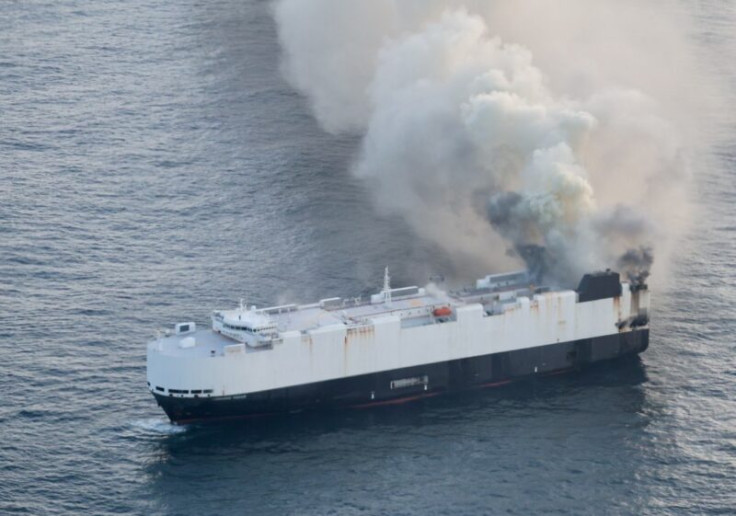Cargo Ship Carrying 751 Electric and Hybrid Vehicles Catches Fire at Sea — All 22 Crew Rescued
The ship continues to billow smoke but no reports of water pollution has been detected so far

A cargo vessel carrying hundreds of electric and hybrid vehicles has caught fire in the Pacific Ocean, with all crew members now safely rescued, the US Coast Guard (USCG) has confirmed.
The Morning Midas, a Liberian-flagged ship managed by UK-based Zodiac Maritime, caught fire approximately 300 miles south of Alaska after smoke was observed billowing from the vessel. The ship was carrying 681 partial hybrid electric vehicles and 70 fully electric automobiles amongst its total cargo of 3,048 vehicles.
All 22 crew members successfully evacuated the burning vessel using a lifeboat and were rescued by the motor vessel Cosco Hellas, one of three Good Samaritan ships that responded to the emergency call. No injuries have been reported.
Emergency Response Coordinates Multi-Vessel Rescue Operation
The drama began on Tuesday afternoon when watchstanders at the Seventeenth Coast Guard District command centre received a distress alert at approximately 3:15 PM, reporting a fire aboard the 600-foot cargo ship.
Coast Guard officials immediately issued an Urgent Marine Information Broadcast (UMIB) requesting assistance from nearby vessels. The response was swift and comprehensive, with three merchant ships answering the call for help.
'We are grateful for the selfless actions of the three nearby vessels who assisted in the response and the crew of motor vessel Cosco Hellas, who helped save 22 lives,' said Rear Admiral Megan Dean, commander of the Coast Guard's Seventeenth District.
The Coast Guard deployed multiple resources to the scene, including the USCG Cutter Munro, a C-130J Super Hercules aircraft from Coast Guard Air Station Kodiak, and positioned an MH-60T Jayhawk helicopter crew in Adak.
In a separate statement, Zodiac Maritime shared that they have appointed Resolve Marine, a leading salvage company, to respond to the fire aboard its managed vehicle carrier. The incident occurred during the vessel's passage to Lázaro Cárdenas, Mexico.
'We are proud of the diligent efforts of our crew in responding to the fire onboard. They immediately activated the vessel's well-drilled emergency firefighting protocols and deployed the onboard fire suppression systems, all of which were fully operational. Due to the intensity of the fire and to prioritise crew safety, the decision was made to abandon the vessel,' the statement said.
All crew members were safely evacuated without injury via one of the vessel's two lifeboats and were subsequently rescued by the crew of the Cosco Hellas. A first tug carrying a team of salvage specialists and specialised equipment has already been mobilised and is expected to arrive at the scene on approximately 9 June.
There it will assess the vessel's condition and provide necessary support. An additional fire-fighting tug, capable of ocean towage, is also being arranged to provide further support.
Following the crew's evacuation and until salvage tugs arrive on scene, Zodiac Maritime continues to monitor the Morning Midas via its onboard satellite-connected systems. While this allows for tracking the vessel's location, the ability to monitor other onboard conditions is limited.
Zodiac Maritime has extended its sincere appreciation to the U.S. Coast Guard for all its continued support during and following the incident.
COAST GUARD, ZODIAC RECOVERY EFFORTS
Coast Guard officials are working closely with Zodiac Maritime to coordinate recovery efforts and assess the environmental impact.
The Morning Midas, a 4,800-tonne vessel built in 2006 by China's Xiamen Shipbuilding Industry, departed from China's Yantai port on 26 May and was bound for Lazaro Cardenas, Mexico, according to London Stock Exchange data.
Maritime experts emphasise that fires involving electric vehicles present unique challenges at sea due to the intense heat generated and the risk of reignition, which can persist for several days.
In 2022, a ship carrying 4,000 luxury cars, including Porsches and Bentleys, sank off the Portuguese Azores archipelago nearly two weeks after it caught fire.
Rising Concerns Over Electric Vehicle Transportation Safety
This incident highlights growing concerns within the maritime insurance industry about transporting electric vehicles across the world's oceans. Fires aboard vessels reached their highest level in a decade during 2024, according to insurer Allianz Commercial.
The confined environment of car-carrying vessels creates particularly dangerous conditions when fires break out. Limited ventilation can rapidly intensify heat, whilst the steel-lined spaces make fire suppression and rescue operations significantly more perilous.
Fires onboard vessels, particularly on container ships, car carriers and roll-on/roll-off ships are a big concern for insurers.
'The reality is the risk remains significant due to the size of these ships and the complexities involved in firefighting and salvage,' Allianz said in its 2025 safety and shipping review report.
Electric vehicle fires burn hotter and longer than conventional car fires, often requiring up to 8,000 gallons of water to cool lithium-ion batteries. The flames can accelerate through chain reactions in a process called thermal runaway, potentially spiralling out of control rapidly.
The investigation into the Morning Midas incident continues, with authorities working to determine the exact cause of the fire and its progression. The nationalities of the rescued crew members have not been disclosed pending notification of their families.
This article has been updated after the initial report that Morning Midas has sunk. According to its maritime company, they are closely monitoring the vessel which remains afloat and based on the most recent images received from a Coast Guard overflight, remains alight with smoke. There have been no reports of pollution to the water so far.
© Copyright IBTimes 2025. All rights reserved.





















